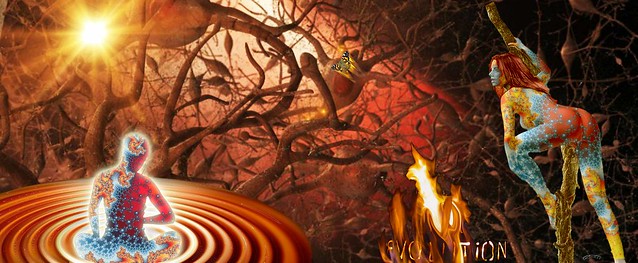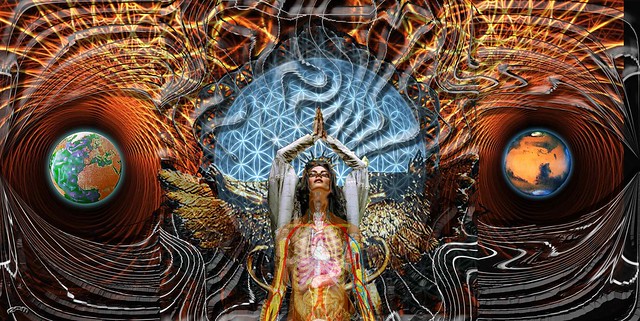Legendary Locks: Can Hair Act as a Sixth Sense, Protecting
us from Danger?

Hairstyles
as depicted on an ancient sculpture of women in the Louvre, France. (Flickr/CC BY-ND 2.0)
Humans have
ever styled their hair in a multitude of creative and symbolic ways, and the various
cuts, colors and presentations reflected across the ages are nearly unlimited.
But does hair serve us in more ways than providing simple warmth and good
looks? There are some who believe that hair is directly associated with sensory
power and it serves as an extension of our nervous system.
Depending upon
the time and place on earth in which one lives, the hair on one’s head (or the
lack thereof) has had intense significance. Belief systems and folklore have
long dictated how hair was to be handled and worn: tied up, covered up, grown
long, cut short, shaved off, crimped, colored and curled, decorated, twisted,
braided, and more. But for many societies, the longer the hair, the better.
Goddess
Sif, wife of Thor, was renowned for her long, golden tresses which were
associated with wheat, fertility and family. (Public Domain)
Hair as a Sixth Sense
In fact,
some feel that long hair gave Native Americans certain sensory abilities, acting as a sort of
antenna, much like whiskers on a cat.
One report
speaks of a claim by a worker at a Veterans Affairs Medical Center in the
United States during the Vietnam War. It is alleged that, like the Choctaw and
Navajo Native Americans known as ‘Code Talkers’ during both World Wars,
talented scouts were sought to move stealthily through rough and dangerous
terrain in conflict zones.
The enlisted
recruits, who were well documented as having “outstanding, almost supernatural
tracking abilities” were said to not perform as expected in the field, and when
questioned about the failures in performance, “the older recruits replied consistently that when they
received their required military haircuts, they could no longer ‘sense’ the
enemy. They could no longer access a ‘sixth sense’, their ‘intuition’ no longer
was reliable, they could not ‘read’ subtle signs as well or access subtle extrasensory
information,” writes WakingTimes.com
A
Native American man with long hair. (Flickr/CC BY 2.0)
The report
claims that government testing institutes compared the behaviors and tracking
performances of Native American trackers with and without long hair, they found
that the long-haired subjects outperformed those whose hair had been cut in
military fashion. The suggested theory was that the long hair might have
behaved as an extension of the nervous system, as, not unlike the way cat
whiskers transmit information to the cat on the prowl as it approaches prey,
the long hair acted like a sixth sense.
Some
skeptics challenge the claims, noting that no evidence has been found as yet to
show that hair is anything more than dead cells (keratin proteins) and as such
transmits nothing. However, strands stem out from our skin, and the follicle at
the base is actually an organ that produces hair. Hair is connected to tactile
receptors in the skin that tell us that it’s cold or hot out, let us feel the
slightest breeze, or the annoying bug that is about to bite us, serving as a
protective warning device.
When our
hairs stand up on the back of our necks when we’re in danger or feel threatened
(known as goose bumps, or horripilation), is that a reflex of something we
detect with our other senses, an unconscious perception affecting the hair? Or
is it our hair affecting us, sending us a warning?
Certainly
there are societies that feel hair plays such an important role in our lives.
The tale of the Native American trackers echoes the ancient biblical myth of
Samson.
The Mighty Samson
It was
written in the Hebrew Bible that Samson, a Hercules-like figure with superhuman
strength, was born a Nazirite with vows to abstain from wine, to have no
contact with the dead, and to never cut a hair on his head. Nearly an
undefeatable man—his superhuman abilities made him a powerful warrior, and he
was able to rip lions apart—he did have a weakness which would lead to his
undoing.
Samson's
Fight with the Lion (1525) Samson’s power was said to be connected to his uncut
hair. (Public Domain)
He fell in
love with a woman (a Philistine, with whom the Israelites were at war) against
the wishes of his parents. Delilah was tasked by her people to find out
Samson’s weakness, so as to defeat the hero that was said to protect the
Israelites.
Samson
revealed to her that it is his long hair that preserved his power, and once he
fell asleep Delilah shaved off his hair, breaking his vows. He awoke to find
that his powers were gone, and he was quickly conquered by the enemy—his eyes
were gouged out and he was made into a slave.
Pictish
carved stone from medieval Scotland depicting Samson with locked hair. In the
Book of Judges 16:19 of the Old Testament, Samson loses his strength when his
seven dreadlocks are cut from his head. (Public Domain)
Symbolism and Folklore of Hair
Perhaps the
Native Americans trackers in the account, with their strong connection to long hair,
lost confidence in their ability to track after cutting their hair. In many
tribes, long hair is a symbol, an extension of the self, and the physical
manifestation of thoughts.
Ancient
Greek kouros sculptures (from c. 615 – 485 BC) are found wearing
dreadlocks – rolled or braided hair. (Public Domain)
In many
cultures, the cutting of hair by oppressors was a punishment or humiliation,
signifying defeat. The shaving off or complete loss of one’s hair, even in
modern society, often symbolizes a seismic shift within a person, whether
spiritually, psychologically, medically, or in the direction of their lives.
Various
tribal hair styles indicate which tribe one belonged to, and whether it was a
time of war or peace. Different styles are used to demonstrate status and rank,
or were worn for certain ceremonies.
There
are many beliefs surrounding very long hair. Portrait of Empress Elisabeth of
Austria (1837 – 1898) with her long hair, which was perfumed and treated with
egg and cognac. “Hairdressing takes almost two hours, she said, and while my
hair is busy, my mind stays idle. I am afraid that my mind escapes through the
hair and onto the fingers of my hairdresser. Hence my headache afterwards.” (Public Domain)
Health is
often gauged by the condition of the hair, and illness or stress can be
detected if it changes its nature or even falls out. Hair has always been an
indicator of age as well, by color and texture, as well as by style. Free,
unbound hair often symbolizes youth, and shorter, tied hair can symbolize a
more mature demeanor. The tighter the binding, the more restricted or severe
and powerful the impression given.
It was held
by many societies that hair, whether styled or not, had magical qualities.
Various
nations of Native Americans have similar beliefs about hair. The Cree people
are said to hold hair as an extension of the soul, and the style displays
personality. Bear fat and soot were sometimes mixed and applied to hair to make
it appear darker. The Mohawk, Pawnee and Algonquin hairstyles are the
inspiration for the dramatic haircut known as a Mohawk today, where the hair is
shorn on the sides leaving a strip like a horse’s mane.
It is
believed that mourning and death are reasons to cut one’s hair throughout many
cultures.
In the UK it
is still said that eating bread crusts will turn your hair curly, and there are
many old beliefs connecting red hair with mischief or a fiery temperament. In
Scotland there’s an old saying that has it that if a magpie bird steals your
cut hair and uses it for its nests will die within a year. This is similar to
beliefs in Lithuania, that birds collecting your cut hair will cause headaches.
Buddhists
have the tradition of keeping short hair, or shaving their heads completely, a
signal that they belong in the spiritual community. In contrast, many cultures
men and women grow their hair long, or, like Samson, are even forbidden to cut
it, but keep it covered due to religious observations.
[Left]
A Buddhist monk with a shaved head (Flickr/CC BY 2.0) [Right] a Sikh man wears his long hair wrapped in a
traditional turban. (Flickr/CC BY-SA 2.0)
It is not
known for sure if the hair is communicating to us as part of our nervous
system, but what is certain is that how we’ve worn our hair has always communicated
something to others.
References
C. Young. “Hair is an Extension of our Nervous
System’ – Why Native Americans Keep Their Hair Long” 2011.
DavidWolfe.com [Online] Available here.
Dunning,
Brian. “The Hair of Samson”
2011. SkepticBlog.org [Online] Available at: http://www.skepticblog.org/2011/12/22/hair-of-samson/
Popovic,
Mislav. “Hair Folklore”. 2012. TraditionsCustoms.com [Online] Available at: http://traditionscustoms.com/folk-beliefs/hair-folklore
Abraham
Rosman, Paula G. Rubel, Maxine K. Weisgrau. “The
Tapestry of Culture: An Introduction to Cultural Anthropology”
2009. Published by AltaMira Press; 9 edition
“Elders talk
about the significance of long hair in Native American Cultures” 2015.
WhiteWolfpack.com [Online] Available here.
Roth, Elana.
“The Story of Samson: A muscle man with a weakness for the ladies.” 2012.
MyJewishLearning.com [Online] Available here.
- Scroll down
through ‘Older Posts’ at the end of each section
Hope you like this
not for profit site -
It takes hours of work every day by
a genuinely incapacitated invalid to maintain, write, edit, research,
illustrate and publish this website from a tiny cabin in a remote forest
Like what we do? Please give anything
you can -
Contribute any amount and receive at
least one New Illuminati eBook!
(You can use a card
securely if you don’t use Paypal)
Please click below -
Spare Bitcoin
change?
And see
New Illuminati’s OWN Youtube Videos
-
DISGRUNTLED SITE ADMINS PLEASE NOTE –
We provide
a live link to your original material on your site (and links via social
networking services) - which raises your ranking on search engines and helps
spread your info further!
This site
is published under Creative Commons (Attribution) CopyRIGHT (unless an
individual article or other item is declared otherwise by the copyright
holder). Reproduction for non-profit use is permitted & encouraged - if you
give attribution to the work & author and include all links in the original
(along with this or a similar notice).
Feel free
to make non-commercial hard (printed) or software copies or mirror sites - you
never know how long something will stay glued to the web – but remember
attribution!
If you
like what you see, please send a donation (no amount is too small or too large)
or leave a comment – and thanks for reading this far…
Live long
and prosper! Together we can create the best of all possible worlds…

